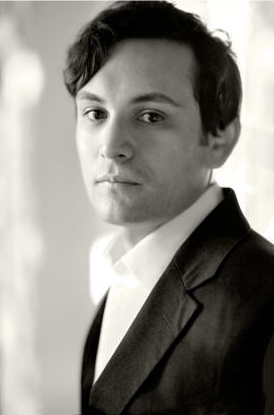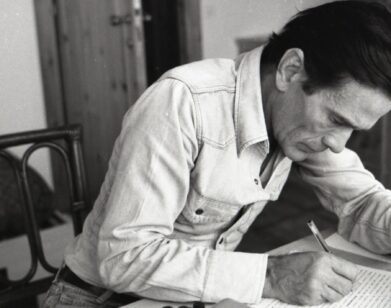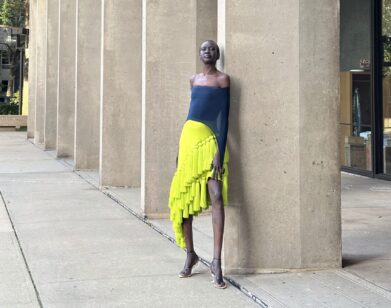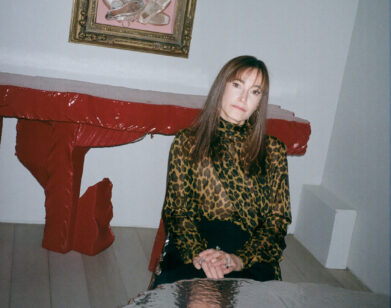Simon Van Booy on Love, Grief, and Long-Distance Travel

SIMON VAN BOOY. PHOTO COURTESY OF KEN BROWAR
Finding love in exotic, foreign climes is a fantasy. In Simon Van Booy’s novel Everything Beautiful Began After (Harper Perennial), three youths form an unlikely romantic triangle in modern-day Athens, then struggle with the tragic ruin it becomes. George is a lonely Southern scholar and hopeless alcoholic. Henry is a British apprentice archaeologist with a terrible childhood secret. Rebecca is a beautiful French ex-flight attendant and budding painter. Together, these self-exiled loners build a fierce connection amidst the sweltering streets of Athens and glittering Aegean seas, only to see it smashed into rubble by an earthquake. In the aftermath of tragedy, Van Booy explores how travelers can get lost in the world, painting their outside experiences with inside pain. We talked with Van Booy (long-distance, appropriately) about how to sustain passion, epic Greek tragedy, infatuation in foreign countries, if we are attracted to others based on smell, and the lessons death can teach us about love.
ROYAL YOUNG: I always had this fantasy that I would travel and as soon as I started forming memories in a place, I would leave. What do you think about traveling as a means of escape?
SIMON VAN BOOY: If you travel too often, you actually come face-to-face with what you’re trying to escape. I feel like when I travel alone, sometimes it’s like being locked in a hotel room with my own worst enemy.
YOUNG: What happens when people’s actions are informed only by passion?
VAN BOOY: Well, in my new book, it’s about sustaining love. I think anyone can fall in love, if you’re open and you’re willing, but the real test is sustaining it after all the excitement has worn off.
YOUNG: How do you go about sustaining it?
VAN BOOY: Relationships break down, because it’s about self. But when you take the “I” out of it and you’re like, how can I make them happy, that means sacrifice. I think you have to be prepared to sacrifice, and a lot of people just aren’t willing to. You have to give up a piece of yourself. By doing that, you get a greater sense of who you are. When you give something up, you need to fill the space where it used to be, and you understand the landscape in yourself a bit more.
YOUNG: How does Athens form your characters?
VAN BOOY: Athens is the birthplace of modern tragedy. In the Greek tragic plays, the tableau of the characters would become a statue, like the statue of Oedipus reaching up to the Gods with blood spilling out of his eyes. I love the way the Greeks would immortalize experience. Things that all of us feel.
YOUNG: Humans are so attracted to tragedy.
VAN BOOY: Absolutely. Because it’s what defines us. Everything that we love will, at some point, be taken away from us. If I think about everyone I love eventually being taken away from me by death, or simply by getting lost from each other in the world, it makes me value them much more now. And I’m much less likely to be indifferent. For me, indifference is the end of life.
YOUNG: Definitely. The combination of love and tragedy is even more alluring. What’s the difference between love and infatuation?
VAN BOOY: I think you can love someone and be infatuated with them, too. But infatuation is immediate, while the sort of love we talk of in the West is something you build with someone. It’s a trust.
YOUNG: So infatuation is fleeting, while love you really have to build and work for and maintain?
VAN BOOY: Yes. Infatuation is very exciting, though.
YOUNG: Especially when you’re in a foreign country.
VAN BOOY: Oh yeah. [laughs] The heat, and you can see the sweat on someone’s neck. It’s just… [laughs]
YOUNG: [laughs] Is it easier to fall in love when you’re younger?
VAN BOOY: I think so, but it’s harder to sustain when you’re younger.
YOUNG: Could you explain that a little bit?
VAN BOOY: Well, when I was in my early twenties, I fell in love at least 20 times a day. You have to be with someone where you think: if the world was full of people like you, I could not be monogamous. As you get older, you get to know yourself a little more. The older you get, the more you realize what you need. And you also realize how your choice in relationships is influenced by how you grew up. For a long time, I was like a casting agent. I was casting myself as a father and casting the woman as the mother and playing out all this stuff from my childhood. Now I feel like I’ve explored the dynamic of how I grew up, and I’m free to find someone who’s really going to be a wonderful companion.
YOUNG: Why do you think we grow up and look for people to replace those we loved in our youth? Why do we play these parts?
VAN BOOY: You can look at it on many levels. One level is the family level. And also, studies show that sometimes we’re not in control of who we choose.
YOUNG: What do you mean?
VAN BOOY: Some studies show that we’re physically attracted, like animal attraction, to people that have a different immune system to us. There was a study done where sixty women were asked to sleep in a T-shirt without showering or wearing any deodorant for several nights. Then the T-shirts were brought to a lab and the women gave blood. Then they had sixty men come in and also give blood. And then the men sniffed the T-shirt and gave each one a score about how sexy or attractive they found the scent. And the blood tests showed that men were attracted to women with different immune systems than them. So even though I love cologne, it’s probably keeping me from finding a good mate.
YOUNG: Because it masks your smell?
VAN BOOY: Yes, we seek to mask ourselves. It’s almost ridiculous. So if you’re about to meet someone for a date, don’t shower for a few days. [laughs]
YOUNG: I’m going to start implementing that.
VAN BOOY: Try it. Don’t shower and then go out and jog a little bit and really get your scent out there. Girls will be looking at you on the subway. They’ll know.
YOUNG: I can’t wait. So there’s definitely the scientific side to attraction. What’s the flip?
VAN BOOY: When someone suffered, or if they experienced something in childhood they may have certain behavior, which seems like a solution to that suffering. If you come into a relationship with understanding and compassion, if you’re willing to say that staying together is worth more than any problem, then that’s it.
YOUNG: I love that idea. When someone dies, do we have a tendency to love them more?
VAN BOOY: Well, that’s the problem, we want to keep loving them, but it’s impossible. They’re not here, just the memory of them. That’s the source of grief.
YOUNG: How do we recover from love?
VAN BOOY: Well, that’s it. We don’t.
EVERYTHING BEAUTIFUL BEGAN AFTER IS OUT JULY 5 ON HARPER PERENNIAL. FOR MORE ON SIMON VAN BOOY, VISIT HIS WEBSITE.






